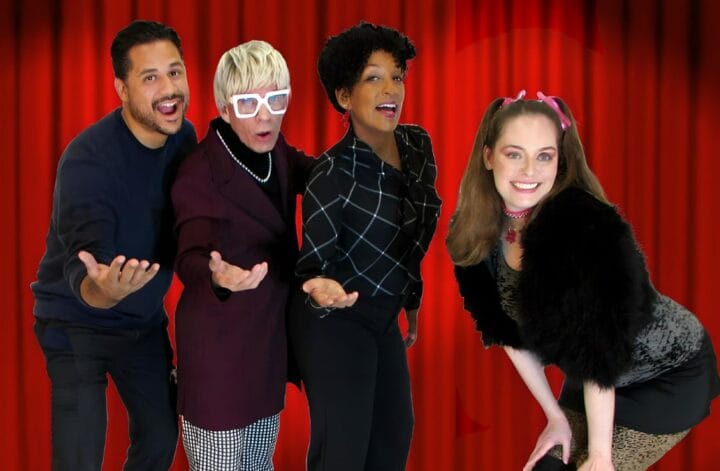I had no idea when I stepped into the Charlotte Burrie Center in Pompano Beach on Sunday to see SYLVIA by A. R. Gurney that I’d also be witnessing history. But I’m so glad I was there to join in the raucous applause for Kris Coffelt, founder and artistic director of Curtain Call Playhouse (CCP), when South Florida Theatre League presented her with the 2025 REMY Award for Outstanding Contribution to Community Theatre right before the show. In her “thank you’s,” Coffelt acknowledged this recognition was “28 years in the making” – ever since she’d moved here from LA and decided to pursue her passion for bringing affordable, quality theater to the public. Over 175 shows later, Coffelt’s inspired touring model of mounting each new production in various locations – from civic centers to art and theater spaces – has become an obvious, popular success.
This company may be “community” in their price point, but everything they do is 100 percent professional. This includes their recurring, experienced actors and “Behind the Scenes” creative team. CCP also provides acting opportunities to talented novices and returning-to-their-first-love retirees. A perfect example of their excellence, opportunity and, in this case, rather daring (and challenging) play selection is the one I’d come for, Sylvia, succinctly described as a modern romantic comedy about a marriage, and a dog. To which one must add . . . and what happens when the two collide.
Sylvia’s multi-talented and experienced director Carla Zackson Heller, who’d directed for Curtain Call for the past 10 years, said they’d chosen the play because it was the 30th anniversary of its off-Broadway premiere. And is notable as having been one of the first gender-bending dramedies of that era. Heller was certainly qualified to take on this directorial challenge (and she was exceptional) as she’d directed the play before – both in her native New York and in South Florida.
She went on to describe what makes Sylvia such a special treat: “I particularly like that this play explores all kinds of boundaries – such as, boundaries in relationships and work, and what makes us human, and who/what can open our eyes to new paths in life, all in a fun-loving way. And above all, there are a lot of belly laughs to be had in this play, and everybody needs that, right?” I completely agree.
Critically acclaimed at its 1995 off-Broadway debut, the play starred Sarah Jessica Parker as “Sylvia,” the dog, with Blythe Danner and Charles Kimbrough. It hit Broadway in 2015, starring Annaleigh Ashford as Sylvia, Matthew Broderick and Julie White. Juicy roles and prominent shoes to fill, but CCP’s cast was fully up to the task.

I must begin by commending the play’s namesake, Sylvia – an abandoned mutt that a groomer will later claim is part French poodle – played by a very cute, young human channeling her inner canine for the role. Rachel Prokopius, who stars as Sylvia, is a biologist who’s finishing her PhD and has appeared in a few ensembles but counts this as her first professional production! (Hard to believe, but a perfect example of CCP’s policy of giving newcomers a chance.) While the dog speaks out loud with her owners (I figured her words reflect what they think she’s feeling, but feel free to see her facility with language as you wish), she is also constantly engaged in dog-like behavior – from panting to scratching, licking to jumping around and sniffing (inappropriately at times) that any dog owner will recognize. And everyone can quickly accept this character as an adorable, if mischievous pup – not unlike the typical loved family pet.
Trouble is, Sylvia is only loved by one member of her two-person household. She and Greg (Alex Gomez) bonded immediately and completely, soon as the abandoned dog jumped onto him at the park. Sylvia tells Greg she loves him because he saved her life. And Greg feels the same. He sees the dog as saving his life from the constant stress of a boss who’d promoted him past his natural abilities and interests, and encroaching middle-age angst about where his life is headed and the type of man he’d become. Greg finds late-night walks with his dog help him reconnect with nature and humanity, reminding him of life’s basic needs – food, shelter, and sex. He also enjoys meeting “all sorts of people from all walks of life” and political persuasions.
The only problem is his wife Kate (Isadelle Mercedes) who absolutely does not want the responsibility of a pet – not when the kids are away at college and she’d finally achieved her masters degree. Now Kate’s excited about the next chapter in her life where she can design special Shakespeare programs to teach inner-city junior-high and high school students. Not to mention, now that they’re living in Manhattan, she and Greg have a busy schedule of evenings out at cultural events and dinners with friends. With both of them working full-time, she says, there’s simply no space in their lives for a dog . . . not to mention how the dog would make messes, shed on (or destroy) the furniture and chew on her shoes.
Arguments ensue. After repeated, agreed-upon “a few days” for her to consider, Kate says a big NO to keeping Sylvia. “Not in New York and not at this stage of our lives.” She’s also being practical, afraid Greg’s frequent afternoons off from work to take Sylvia to the park will cost him his job . . . and then how will they pay for the kids’ college? When she puts down the part-Lab dog for being a mongrel, Greg reminds Kate that she herself is “multicultural.” And Sylvia accuses her with: “You are prejudiced against dogs.”
Dog-themed songs play at scene changes. This time it’s a loud blast from the past of “Who Let the Dogs Out.”
At the park, Greg often chats with fellow dog lover (and quite the character) Tom (John Hernandez in his first of three distinct roles). Meanwhile Sylvia gets to frolic (and more, which results in her getting fixed) with Tom’s male dog, Bowser (whom we hear a lot about, but don’t see). Macho Tom spouts several theories about the man-and-dog relationship – including that women feel threatened by their closeness because it’s more like a romance while, for women, dogs bring out maternal instincts. Tom also has a theory about his own “biophilic” gene, which drives him to connect with natural life, and feels biophiles should only be with other biophiles. (His “gene-atrophied” wife will soon leave him.) Whatever the reason, or relationship, Greg’s obsession with Sylvia has seriously compromised his marriage but he doesn’t seem to realize how much.
Greg drives his wife to the airport for a conference in Indianapolis and then waits with her when her flight is delayed, though they barely speak. Meanwhile, back home, we are treated to lonely, pining Sylvia singing, “Every time we say good-bye, I die a little.” Then both Greg and Kate join her in the musical number. Kind of a strange, funny/sad interlude, but at this point, nothing should surprise us!
While she’s an ongoing comfort to Greg, living with Sylvia has stressed Kate to the breaking point. We see evidence of the damage when she runs into an old friend from Vassar, invites Phyllis (John Hernandez, again, as “a lady who lunches”) to her home and then, no matter how much Phyllis tries to engage her in setting a date for a future party with Upper East Side glitterati, all Kate can do is complain about Sylvia’s disgusting habits (like drinking out of the toilet) and how Tom is hopelessly smitten. Phyllis gets so outraged, that it drives her to drink (literally, as she’d recently quit but now joins Kate in drowning her misery in whiskey, then rushes out the door).
But Kate won’t give up without a fight. She gets a grant to study in England, it comes with an enticing spousal supplement for Greg . . . arriving dogs, however, require a six-month quarantine. When Greg realizes she’d planned this to separate him from Sylvia, he says he doesn’t want to go but Kate responds “I followed you for 22 years.” Now it’s time he supports her dream.
Where do modern couples go when they can’t work things out on their own? To a therapist, of course. In this case, an androgynous one who says he/she is called “Leslie” and dresses in non-binary clothing so clients can choose which gender they feel most comfortable with calling him or her. (The play takes place in the mid-1990s before “they” became an option.) And who do you suppose plays this Leslie in huge white glasses, sophisticated dress, and southern drawl? None other than a completely unrecognizable John Hernandez. I later heard an audience member say it was worth seeing the show just for Hernandez’s spectacular transformations! Like a person impersonating a dog, this actor’s different-in-every-way character roles are a wonder to behold.
But while Leslie offers standard practical advice no one wants to hear, like: “These are the dangerous years – the first hint of retirement and the whiff of a nursing home” – he does make sense when reflecting that Greg had lived with (and likely taken comfort from) “a different kind of woman, a wife in the suburbs and a subservient daughter. If Sylvia didn’t exist, you’d have to invent her. You returned to a kind of pastoral nostalgia.”
The therapist instructs Greg to drop the leash, take his wife’s hand, and together accept the challenges that come later in life. He decides to speak to him separately, but even we cringe when each time he thinks he’s reaching Greg – when he assumes he’s discussing his relationship with his wife – all of Greg’s emotions are still centered on the dog. Like Phyllis before him, Greg’s Sylvia obsession even causes the therapist to have a mental breakdown. Next thing we know, Leslie’s shouting at Kate: “First divorce Greg! Then get a gun and shoot Sylvia right between the eyes!”



